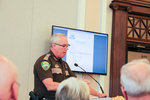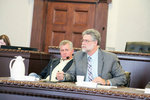




Area lawmakers had the opportunity to hear about issues important to those living in their districts during a Legislative roundtable event on Friday.
The Board of Lewis County Commissioners, county employees, elected officials, mayors of area cities and members of the community addressed five legislators representing the 19th and 20th districts, who then responded to various concerns.
The biggest focus of the meeting centered around the decreasing ability to collect fees in the court system and unfunded mandates, a term used to describe state laws and regulations that are required of local government by the state, which does not provide additional money to fulfill the set requirements.
Ron Averill, a former Lewis County commissioner, asked the lawmakers to look at alternatives to help counties and cities that are struggling.
“Lewis County is one of the few counties in the state during the great recession that did not go into the red,” he said. “We did that by cutting back to the bone. Unfortunately the great recession still hasn’t allowed us to come back and put any meat on that bone … It’s time we pull out and relook at how do we finance rural area cities and counties and how do we organize them.”
Rep. Richard DeBolt, R-Chehalis, said the House has tried to address the costs through a bill directed specifically toward unfunded mandates in the past several times with no success.
“We will try again,” he said.
Scott Tinney, the Lewis County clerk, said there has been a decline in the ability to recoup costs of the court system because certain fees can now go unpaid by those who work through the court system and amass bills. He urged the Legislature to come up with a fix and find alternative ways of funding services such as indigent defense, which bears a large cost to the county when it comes to paying for attorneys to represent those who can’t afford them.
District Court Judge R.W. Buzzard and Sheriff Rob Snaza also spoke of decreasing revenue.
Non-moving violations can go unpaid without any effect on a person's driver’s license, and the Legislature has recently considered a bill that would allow someone who initially can’t afford their own attorneys to keep that status throughout court proceedings even if they later become employed.
“There’s no incentive to not engage in that bad behavior,” Buzzard said about the court fees that can go unpaid, adding that is comes down to an issue of responsibility.
According to Commissioner Edna Fund, indigent defense cost the county $1.2 million last year and is expected to increase to $1.5 million for this year.
“It’s truly an unfunded mandate,” she said. “I know it came from the supreme court, but we need some help and relief on that.”
Along with fees that go unpaid, Snaza said law enforcement officials need help addressing medical costs in the jail. The law and justice system accounts for approximately 75 percent of the county’s budget, he noted. As individuals go into the Lewis County Jail, their Medicaid is no longer valid, so the burden to pay those costs goes to the taxpayers. According to Snaza, 74 percent of the inmates at the Lewis County Jail receive Medicaid.
“That means out of the about 200 people in our facility, 74 percent of them, we are all paying for as we speak,” he said.
Jail medical costs have risen to the $1 million mark, he said.
Eric Eisenberg, with the prosecutor’s office, asked the lawmakers to help streamline and modernize county government. He said the law and justice council, which is currently mandated, is required to meet four times a year, but is not required to provide any service.
“We have a mandatory body that has nothing that it’s asked to do,” he said, adding he’d like to see the council changed to a discretionary board.
Eisenberg also said the law library should be overseen by the courts, since it is now mainly based online.
Economic development and flooding in the area were also brought up to the legislators.
Sen. Dean Takko, D-Longview, said he was disappointed that a capital budget was not passed because it would have included about $60 million to address flooding in the Chehalis River Basin, including the 19th District, which he represents.
DeBolt said many steps have been taken to find a solution to funding, including the creation of the Office of the Chehalis Basin. There is no real delay to that office, unless the budget is not passed by Nov. 20, according to DeBolt. Those in attendance still expect the budget to be approved next month.
The capital budget is currently being “held hostage,” representatives said, as the House and the Senate try to come to an agreement on how to react to Hirst decision, a state Supreme Court water-rights ruling that states water availability studies are the responsibility of local jurisdictions and property owners, rather than the Department of Ecology.
Lawmakers said a middle ground needs to be reached because Hirst primarily affects rural counties.
“I don’t agree with holding the capital budget hostage over the issue, but the issue is real,” Rep. Brian Blake, D-Aberdeen, said. “The tax shift that will happen over time with that Hirst decision is going to cause some real problems in rural Washington.”
Lewis County Assessor Dianne Dorey said Hirst would cause undeveloped land values to drop, which would result in other taxpayers picking up the burden. If new construction dollars diminish because of the decision, it will impact taxing districts as well, Dorey said.
Another issue brought up by Commissioner Gary Stamper is declining timber revenue. He asked the legislators to exercise oversight as the Department of Natural Resources develops plans that could have significant impact on timber harvest levels, which could negatively impact Lewis County.
As the county faces a 68 percent increase in employee premiums through their current insurance provider and attempts to switch over to the Public Employees Benefits Board Program, Commissioner Bobby Jackson asked lawmakers to follow the issue. Currently, PEBB is asking for information such as claims that are considered proprietary by major insurance carriers, and therefore cannot be released. A meeting has been set for next week where PEBB will hopefully rescind that particular requirement, Jackson noted.
Because of the county’s aging employee population, which has a median age of 53, according to Jackson, insurance costs continue to go up.
“Finding affordable health care becomes more and more of a struggle,” Archie Smith, human resources director for the county, said.
With the lack of a state capital budget, mayors of local cities and towns expressed concerns about projects that were put on hold because of the delay in funding.
Representatives from the 20th district included DeBolt and Ed Orcutt, R-Kalama.
Sen. John Braun, R-Centralia, was not in attendance.
From the 19th district, Takko, Blake, and Rep. Jim Walsh, R-Aberdeen, attended.